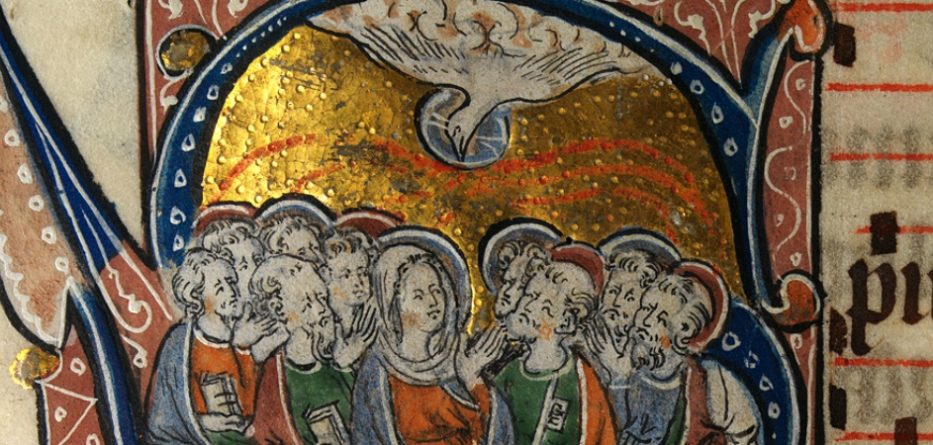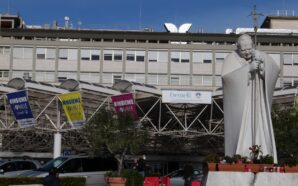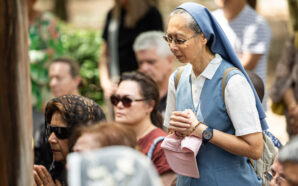Homily for Pentecost Sunday Year A 2020
Readings: Acts 2:1-11; 1 Cor 12:3-7, 12-13; Jn 20:19-23
31 May 2020
Today we celebrate the feast of Pentecost.
In Old Testament times, the Chosen People probably took on this agricultural feast from the Canaanites. Celebrated seven weeks (or 50 days) after the feast of the unleavened bread when the first barley was harvested, this harvest festival was a day of great rejoicing, marking the end of the harvest with leavened loaves being offered in thanks. This agricultural feast then took on added significance for the Jews after the Exodus, marking the date of their arrival at Sinai where the covenant was revealed.
For us Christians, fifty days after the resurrection of Jesus, we celebrate that distinctive Pentecost day recounted at the commencement of the Acts of the Apostles when the disciples from anywhere and everywhere had gathered in a house in Jerusalem each hearing the Galilean apostles preach in their own language.
They heard, understood and relished messages ‘about the marvels of God’. Thereafter the Acts of the Apostles recalls many instances of divisions within the emerging Christian community – with differing approaches by Peter, Paul and James. Within the Jewish community, there are divisions about what the following of Jesus might mean for them. And there are even greater divisions within the Jewish community as to what should be the requirements for Gentiles wanting to follow Jesus while co-existing with Jewish Christians. In the midst of all these controversies, Paul always insists that there is a variety of gifts, but always the same Spirit.
This year, as always, Pentecost falls during the Week for Christian Unity. And this year distinctively for us Australians, it falls during National Reconciliation Week with the theme chosen by Indigenous people: ‘In this together’. In the midst of our differences and in the light of our history, how do we celebrate the gifts of the Spirit, how do we discern the gifts of the Spirit, and how do we share these gifts?
LISTEN: https://soundcloud.com/frank-brennan-6/pentecost-homily-during-national-reconciliation-week
In his opening speech to the Second Vatican Council on 11 October 1962, Pope John XXIII invoked the Holy Spirit ‘in order that the work of all may correspond to the modern expectations and needs of the various peoples of the world’. He told the assembled Church Fathers: ‘This requires of you serenity of mind, brotherly concord, moderation in proposals, dignity in discussion, and wisdom of deliberation’. Before each commission meeting of the Council, the Council Fathers prayed a prayer to the Holy Spirit which had been composed by St Isidore of Seville back in the seventh century: ‘May you, who are infinite justice, never permit that we be disturbers of justice. Let not our ignorance induce us to evil, nor flattery sway us, nor moral and material interest corrupt us. But unite our hearts to You alone, and do it strongly, so that, with the gift of your grace, we may be one in you and may in nothing depart from the truth. Thus, united in your name, may we in our every action follow the dictates of your mercy and justice’.
Three years before opening the Second Vatican Council, Pope John XXIII issued his encyclical Ad Petri Cathedram in which he said:
‘The Catholic Church, of course, leaves many questions open to the discussion of theologians. She does this to the extent that matters are not absolutely certain. Far from jeopardizing the Church’s unity, controversies, as a noted English author, John Henry Cardinal Newman, has remarked, can actually pave the way for its attainment. For discussion can lead to fuller and deeper understanding of religious truths; when one idea strikes against another, there may be a spark. But the common saying, expressed in various ways and attributed to various authors, must be recalled with approval: in essentials, unity; in doubtful matters, liberty; in all things, charity.’
Nowadays, we hear an increasing chorus of curial officials in Rome expressing displeasure or reservations about Pope Francis. We hear an increasing range of voices in the Australian church pleading for greater transparency and good governance by our bishops. The internet seems to be an instrument for discord. Unity, liberty and charity often seem to be in short supply. We need to pray earnestly for the gifts of the Spirit for the good of our Church and for the good of our society.
This past week, many of us have been recalling the splendid Sunday twenty years ago when hundreds of thousands of us crossed bridges saying ‘Sorry’ and pledging ourselves to national reconciliation between the First Australians and the rest of us. I was one of the 150,000 who crossed Sydney Harbour Bridge that day. I was with family and encountered many friends en route, Aboriginal and non-Aboriginal. When the plane wrote the white word Sorry in the blue sky over Sydney Harbour, most of us on that bridge were delighted. For some of us, the delight turned to joy when three pelicans flew overhead. Just two weeks before, Aboriginal leader Pat Dodson had concluded his Wentworth lecture with the observation: ‘The pelican gliding across the water is like the spirit of reconciliation, black and white together, moving forward.’ Reconciliation seemed simple, achievable, and almost sacramental.
The crowd on the bridge came with a common commitment to reconciliation, across racial lines and across political allegiances. Most, but not all, walkers were happy to make or receive an apology for the stolen generations. All were there to seek reconciliation with their fellow citizens. No sooner had the walk finished than the political argy-bargy commenced over unmet Aboriginal demands including treaty and compensation for the stolen generations. Priest writer Ed Campion reflected:
‘If you had asked every person on the Bridge walk why he or she was there, you might have got a different answer from each one of them. The Sorry word was much in evidence, as was Apology and Treaty. Succeeding weeks would show that a diversity of activists could justly claim some sort of a Bridge mandate for their particular proposals. One meaning was instantly clear. Whatever its outcomes, Corroboree 2000 was a radical demonstration of conscience. It was a recognition that Australia had not given everyone a fair go and that it is time to face the moral question which haunts us all.’
While on the bridge, I met the poet Noel Rowe. I was not much in the mood for deep philosophical reflection. I was hoping for some unalloyed joy and celebration as a break from the complex politics of treaty and compensation. I recall Noel being delighted with the ambiguity and complexity of the world of meaning around us. I was more interested in simplicity. Noel later wrote: ‘We live in a world…where words of reconciliation are spoken from a single, empowered position.’ In a splendid essay of literary criticism, he wrote: ‘Stories do not always subscribe to the best intentions of authors – or, indeed, critics. This is true even of our allegedly more enlightened era.’ He reflected on the work of one white writer who compiled stories of the stolen generations. ‘While (the author) makes her editorial position clear, recording that she received appropriate permissions and declaring the moral and ameliorative purpose of story, what she does not declare, and what seems to have gone unnoticed, is that the stories are arranged so that as the volume progresses the voices become more and more reconciled. In other words, individual Indigenous stories are told into and within an underlying narrative of hope. Whose story is this? If it is (the author’s), is it another white fantasy designed to evade the hard realities of reconciliation or/and is it part of that give and take necessary for the longer work of cross-cultural conversation?’ I still relish the simplicity of my unalloyed joy on the bridge that Sunday twenty years ago. But I daresay the Spirit was also at play in Noel’s ambiguity and complexity. Reconciliation is never simple. Only those with power can make the mistake of thinking it is.
Twenty years on, we are recalling the event at Uluru three years ago when 250 Aborigines and Torres Strait Islanders gathered to consider how they might best be recognised in the Australian Constitution which does not even mention them nor the history of their ancestors. They issued a statement from the heart at Uluru telling us that their sovereignty is ‘a spiritual notion’. They told us:
[The] ancestral tie between the land, or ‘mother nature’, and the Aboriginal and Torres Strait Islander peoples who were born therefrom, remain attached thereto, and must one day return thither to be united with our ancestors. This link is the basis of the ownership of the soil, or better, of sovereignty.
This statement is an adapted quote from the submission put by Mr Bayona-Ba-Meya, Senior President of the Supreme Court of Zaire, who appeared on behalf of the Republic of Zaire in the International Court of Justice in 1975 dismissing ‘the materialistic concept of terra nullius’ substituting ‘a spiritual notion’. Judge Fouad Ammoun, the Lebanese Vice-President of the International Court, quoted the submission in his judgment in the Advisory Opinion on Western Sahara. This part of Judge Ammoun’s opinion was then quoted by a couple of the judges in the High Court Mabo decision. How extraordinary that the inheritors of the longest living culture on earth would quote a Lebanese judge who in turn was quoting a lawyer from Zaire to express the depths of their spiritual relationship with the land. This is a profound lesson for those of us seeking an inclusive Australia. We are able to share our diverse cultural and religious modes of expression to communicate the deepest yearnings of our hearts. The Muslim Judge Ammoun observed in his judgment that the ‘spirituality of the thinking of the representative of Zaire echoes the spirituality of the African Bantu revealed to us by Father Placide Tempels, a Belgian Franciscan, in his work Philosophie bantoue. The author sees therein a “striking analogy” with “that intense spiritual doctrine which quickens and nourishes souls within the Catholic Church”.’
In the diversity, complexity and conflicts of our world, we need to be attentive to the spirit at work leading us to truth, justice, healing and reconciliation – open to dialogue, respectful of others, especially those whose stories are central to the affirmation that we are ‘In this together’. Like those disciples from diverse places and cultures at the first Christian Pentecost, and like the Chosen People at every Pentecost grateful for the fruits of the harvest and of the covenant, let’s leave the house filled with the Spirit professing: in essentials, unity; in doubtful matters, liberty; in all things, charity. Let’s not stay locked away in the house, afraid, talking only to those who are likeminded. Like the disciples in today’s gospel, let’s hear Jesus telling us, ‘Peace be with you. As the Father sent me, so am I sending you.’ I wish you a blessed Pentecost.
Fr Frank Brennan SJ is the Rector of Newman College, Melbourne and the former CEO of Catholic Social Services Australia (CSSA).








